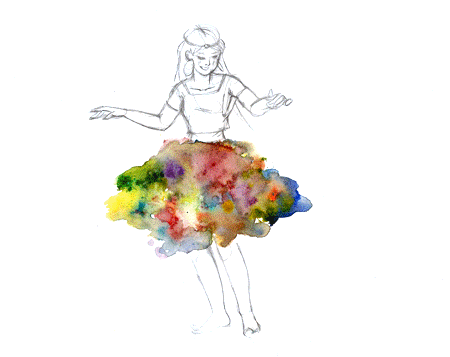Say "Yes" Without Fear and "No" Without Guilt

I’ve done it. I live without fear or embarrassment, and now I’m not afraid to tell you that you can do what you want in your own personal space. But in mine, I want your respect. I say “no” directly to people who turn clear days into storms, and I say “yes” to my life, my desires, and of course, my dignity.
Asserting yourself without attacking others is an attitude and a behavior that not everyone knows how to achieve. Sometimes, pride is confused with selfishness, and self-affirmation is confused with the imposition of your own values onto someone else. However, saying “yes” without fear and “no” without guilt is much more than a necessary exercise of mental health and survival.
I dress how I want, I come and go when I please, I listen, I respect, and I state my opinions. A long time ago, I learned to live without fear, to say “no” without guilt and to say “yes” when I feel like it, because even though my heart has a door open for anyone who wants to enter, there’s also another door open for those who want to leave.
Every day, we encounter the same types of people. On one hand, there are those who want to get along with everyone and always have a selfless and devoted “yes” ready to leave their lips. And on the other hand, there are those who have more nerve. The kind of people who say “nobody has the right to tell me what to do,” or “I don’t owe you anything, so get out of my way.”
Extremes are never good, because the key to a wise and respectful existence lies in the middle, where you can assert yourself without attacking others, but without succumbing to other people’s demands just to please them and fit in.

Saying “no” without fear: personal validation
When we were kids, nobody taught us about self-esteem. Depending on our upbringing and our childhood and adolescent experiences, we develop a sort of substitute for it so that we can more or less survive.
However, the sure-fire tests of self-esteem come with time. They’re complicated instances that nobody is prepared for, moments that test our fears, our weaknesses, and our courage and force us to adapt to this tremendously complex world. Neither inflated nor blunted egos can be functional or even happy during these times.
Saying “yes” without fear, but with respect for every one of your aspirations and needs, is vitally important. For example, many of us are taught implicitly about the “law of personal attrition,” or the external complacency that leads you to constantly seek the approval of others in order to validate yourself as a person. Our dignity, in this case, remains trapped in the dungeons of fear and indecision.

Also, it’s common to stay quiet and stifle your desires and wishes for fear of being sanctioned, or worse, rejected, by the people around you and seeing the disappointment in their faces. If you don’t do something about it, you gradually end up invalidating yourself, taking away your legitimacy to have a voice, to breathe, and simply to be someone who says “yes” when life invites you to live.
Saying “no” without guilt: living a harmonious life
Learning to accept yourself shouldn’t take your whole life, despite what most people say. It should be required to practice self-acceptance and self-esteem starting from childhood. Self-acceptance should be a healing and freeing religion where you can believe in yourself, and also in your capacity to respect yourself and others.
Because living without the fear of saying “yes” and without feeling guilty for saying “no” is living a harmonious life, surviving every realm of existence, and rewarding yourself with genuine and complete respect for your self-esteem and for the people around you.
We urge you to remember the following points to learn how to say “no” when you need to, without weighing down on your conscience.

How to be assertive without feeling guilty
Asserting yourself without being aggressive is an art that should be performed elegantly, but also with sharp precision. Nothing you say should lead to misunderstandings. Every word should be defined and should outline your needs, your vital rights, and your nonnegotiable limits.
- Saying “no” when others expect a “yes” is not an act of betrayal. It’s affirming your stance so that others can act accordingly and get to know you better as a person.
- A timely “no” can save lives, especially yours. It will save you from situations that would have put you in the thick of unhappiness, the shackles of selfish demands, and the suffering that we should all defend ourselves against.
- Say “no” at the proper time, without any fear or embarrassment. The people who love you will accept it respectfully, and in fact, they won’t even be surprised because they know you. And the people who resist it or feel betrayed have only two options: accept it, or leave through the back door of your heart.
It’s all about being authentic and having a sense of survival where you can finally stop hiding and being embarrassed. Because happiness is found beyond the lines of fear, which you should cross valiantly, with your head held high, your eyes open, and your heart happy.
I Prefer a Dignified Solitude Over an Incomplete Relationship
I’ve done it. I live without fear or embarrassment, and now I’m not afraid to tell you that you can do what you want in your own personal space. But in mine, I want your respect. I say “no” directly to people who turn clear days into storms, and I say “yes” to my life, my desires, and of course, my dignity.
Asserting yourself without attacking others is an attitude and a behavior that not everyone knows how to achieve. Sometimes, pride is confused with selfishness, and self-affirmation is confused with the imposition of your own values onto someone else. However, saying “yes” without fear and “no” without guilt is much more than a necessary exercise of mental health and survival.
I dress how I want, I come and go when I please, I listen, I respect, and I state my opinions. A long time ago, I learned to live without fear, to say “no” without guilt and to say “yes” when I feel like it, because even though my heart has a door open for anyone who wants to enter, there’s also another door open for those who want to leave.
Every day, we encounter the same types of people. On one hand, there are those who want to get along with everyone and always have a selfless and devoted “yes” ready to leave their lips. And on the other hand, there are those who have more nerve. The kind of people who say “nobody has the right to tell me what to do,” or “I don’t owe you anything, so get out of my way.”
Extremes are never good, because the key to a wise and respectful existence lies in the middle, where you can assert yourself without attacking others, but without succumbing to other people’s demands just to please them and fit in.

Saying “no” without fear: personal validation
When we were kids, nobody taught us about self-esteem. Depending on our upbringing and our childhood and adolescent experiences, we develop a sort of substitute for it so that we can more or less survive.
However, the sure-fire tests of self-esteem come with time. They’re complicated instances that nobody is prepared for, moments that test our fears, our weaknesses, and our courage and force us to adapt to this tremendously complex world. Neither inflated nor blunted egos can be functional or even happy during these times.
Saying “yes” without fear, but with respect for every one of your aspirations and needs, is vitally important. For example, many of us are taught implicitly about the “law of personal attrition,” or the external complacency that leads you to constantly seek the approval of others in order to validate yourself as a person. Our dignity, in this case, remains trapped in the dungeons of fear and indecision.

Also, it’s common to stay quiet and stifle your desires and wishes for fear of being sanctioned, or worse, rejected, by the people around you and seeing the disappointment in their faces. If you don’t do something about it, you gradually end up invalidating yourself, taking away your legitimacy to have a voice, to breathe, and simply to be someone who says “yes” when life invites you to live.
Saying “no” without guilt: living a harmonious life
Learning to accept yourself shouldn’t take your whole life, despite what most people say. It should be required to practice self-acceptance and self-esteem starting from childhood. Self-acceptance should be a healing and freeing religion where you can believe in yourself, and also in your capacity to respect yourself and others.
Because living without the fear of saying “yes” and without feeling guilty for saying “no” is living a harmonious life, surviving every realm of existence, and rewarding yourself with genuine and complete respect for your self-esteem and for the people around you.
We urge you to remember the following points to learn how to say “no” when you need to, without weighing down on your conscience.

How to be assertive without feeling guilty
Asserting yourself without being aggressive is an art that should be performed elegantly, but also with sharp precision. Nothing you say should lead to misunderstandings. Every word should be defined and should outline your needs, your vital rights, and your nonnegotiable limits.
- Saying “no” when others expect a “yes” is not an act of betrayal. It’s affirming your stance so that others can act accordingly and get to know you better as a person.
- A timely “no” can save lives, especially yours. It will save you from situations that would have put you in the thick of unhappiness, the shackles of selfish demands, and the suffering that we should all defend ourselves against.
- Say “no” at the proper time, without any fear or embarrassment. The people who love you will accept it respectfully, and in fact, they won’t even be surprised because they know you. And the people who resist it or feel betrayed have only two options: accept it, or leave through the back door of your heart.
It’s all about being authentic and having a sense of survival where you can finally stop hiding and being embarrassed. Because happiness is found beyond the lines of fear, which you should cross valiantly, with your head held high, your eyes open, and your heart happy.
I Prefer a Dignified Solitude Over an Incomplete Relationship
This text is provided for informational purposes only and does not replace consultation with a professional. If in doubt, consult your specialist.







